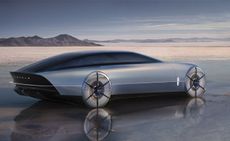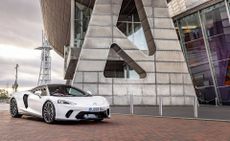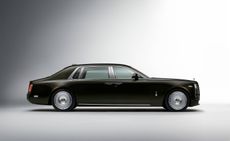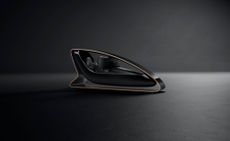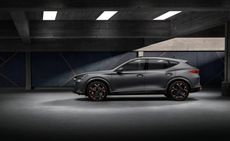New 2022 Range Rover is an architectural powerhouse
Tough but refined, the 2022 Range Rover cloaks its athletic abilities and off-road agility beneath a sharp suit informed by a modernist approach
- (opens in new tab)
- (opens in new tab)
- (opens in new tab)
- Sign up to our newsletter Newsletter
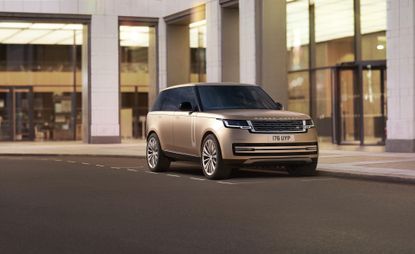
Land Rover has taken the wraps off the 2022 Range Rover, its latest and most complex Range Rover model to date. It’s been nine years since the fourth generation Range Rover was launched, arriving in a sector that it had practically all to itself. In 2021, there’s a very different landscape in the world of luxury SUVs. Rolls-Royce, Maybach, Bentley, Lamborghini, Aston Martin, Mercedes, and even Ferrari, are all vying for attention in this most prominent, highly conspicuous market segment.
Range Rover was there first, pretty much, with the first model dating back to 1969 and existing in glorious isolation for decades. That 50-year heritage still serves as a bulwark against its competitors: Range Rover is ‘the original luxury SUV’, the company proudly states. It’s also one of the few cars explicitly informed by a ‘modernist design philosophy’, an approach that tallies with what Professor Gerry McGovern, Jaguar Land Rover’s chief creative officer, has been telling us all along: classic modernism is the best modernism.
2022 Range Rover

So, has the fifth generation, 2022 Range Rover got the technical chops to match up to the image, or is this familiar machine undergoing something of a mid-life crisis? Stylistically, this is an evolution, not a revolution. The Range Rover’s bluff but buff lines have become more pavilion- and yacht-like than ever before, eschewing conventional automotive detailing or traditional curves in favour of chamfered edges, crisply stamped panels, and a purist delineation between glasshouse and body.
The most notable departure is at the rear, where a new light treatment makes the most of LED technology to reshape the car’s trademark split tailgate as a strong, almost abstract graphic element. Function is almost completely concealed, a bit like how the stern of superyachts can conceal all manner of folding docks and platforms. Appropriately enough, the company calls this feature a ‘sweeping boat tail’.

Is this the first truly minimalist motor car? McGovern and his team have chased every spare millimetre in the quest for seamless shut lines, and precise transitions between roof to glasshouse to shoulder. It’s certainly minimalist in the mould of Claudio Silvestrin or Glenn Sestig, in that its pared-back forms are in no way a concession to ease of construction or modesty of materials.
This is a luxury car. Granted, there are innovations, like the new Ultrafabrics and Kvadrat wool-blend upholstery as an alternative to leather. The dashboard, 13.1in touchscreen and wood-clad centre panel convey a domestic warmth, not a performance-focused cockpit. But true to form, the new Range Rover cloaks its athletic abilities and off-road agility beneath a sharp suit.

There’s also a lot of new communications technology on board, from the integration of Amazon Alexa to the optional rear-seat 8in control screen (in addition to the rear-seat entertainment screens). The car is festooned with cameras, which are supported by a set of manoeuvring lights designed to light up dark country lanes and fields for a better view through the 3D Surround Camera system. Given the right sized spot, you can command the 2022 Range Rover to park itself, or squeeze into tight spaces, even if you’re not in the car.
The rear view mirror flips between a traditional mirror and a digital screen, while the company’s innovative ClearSight Ground View system effectively gives you a ‘transparent’ bonnet, showing the terrain beneath the mighty prow on the main display screen for careful negotiation of off-road pitfalls.

Perhaps surprisingly, the new Range Rover still comes with a full set of engine options, from diesels all the way through to plug-in hybrid. It’s a sign of how many of the car’s key markets and customers still haven’t made the necessary shift to minimise their emissions. The plug-in models will take you up to 62 miles in electric mode, which is much better than nothing, but if you can hang on until 2024, you’ll be able to buy the first fully-electric Range Rover, which in a sense will be a much more significant milestone. The first wave of electric 4x4s are already here, and proving themselves especially adept at one of the Range Rover’s core skills, off-roading.
For the first time, the Range Rover will be offered with seven seats, a welcome dose of practicality that makes sensible use of the car’s immense size. There’s also a Long Wheelbase body, available right from the outset, as well as a special Launch Edition with an enhanced package of optional extras.

For now, seekers of extraordinary feats of performance will have to plump for a new twin turbo V8, which provides enough grunt to get this titanic machine to 62mph in an indecent time of around 4.4 seconds. Expect the EV to be quicker.
Launching a new flagship when the chips are down is not ideal. In the face of global silicon supply shortages, car makers around the world are having to throttle production of their tech-heavy products. Land Rover is no exception. We’ll reserve judgement on how the new Range Rover behaves both on and off the road until we get a chance behind the wheel. For now, look upon this behemoth in wonder. Perhaps the auto industry could do with a bit more modernist restraint at every scale.
INFORMATION
Fifth generation Range Rover, available in 2022, price tbc
landrover.co.uk (opens in new tab)
Jonathan Bell has written for Wallpaper* magazine since 1999, covering everything from architecture and transport design to books, tech and graphic design. He is now the magazine’s Transport and Technology Editor. Jonathan has written and edited 15 books, including Concept Car Design, 21st Century House, and The New Modern House. He is also the host of Wallpaper’s first podcast.
-
 Design podcasts to discover: creative giants share smalltalk and big ideas
Design podcasts to discover: creative giants share smalltalk and big ideasListen to the best design podcasts by creators, curators and journalists shining a spotlight on different areas of the design practice
By Rosa Bertoli • Published
-
 2022 fashion highlights, as picked by the Wallpaper* team
2022 fashion highlights, as picked by the Wallpaper* teamThe Wallpaper* fashion and beauty team reflect on their personal 2022 fashion highlights – from Gaetano Pesce at Bottega Veneta and Wales Bonner in Florence to intrigue and seduction at Prada
By Jack Moss • Published
-
 Marre Moerel’s swinging flame candle uses artful balance
Marre Moerel’s swinging flame candle uses artful balanceVita Balanza by Marre Moerel and Santa & Cole has turned candles into a balancing act
By Martha Elliott • Published
-
 Peugeot’s sparky 308 gets hybrid power and handsome lines
Peugeot’s sparky 308 gets hybrid power and handsome linesThe Peugeot 308 proves that mass-market design needn’t be dull, blending hybrid power with sharp lines and excellent detailing
By Jonathan Bell • Last updated
-
 BMW Motorrad brings out the big guns for its newest cruisers
BMW Motorrad brings out the big guns for its newest cruisersBMW Motorrad R 18 Bagger and Transcontinental set the tone for high-voltage cruising with a brand collaboration with speaker specialist Marshall
By George Chapman • Last updated
-
 Dacia’s new Manifesto concept is a true outdoor utility vehicle
Dacia’s new Manifesto concept is a true outdoor utility vehicleUtilitarian auto brand Dacia sets a bold new agenda with its Manifesto, a concept car pitched at the active outdoor market
By Jonathan Bell • Last updated
-
 The sun sets on traditional supercars at California’s Monterey Car Week
The sun sets on traditional supercars at California’s Monterey Car WeekMonterey Car Week, the world’s most prestigious car gathering, is showcasing ever-more extravagant special editions, coachbuilt cars and all-new electric concepts. Here are seven key machines from 2022
By Rory FH Smith • Last updated
-
 Is McLaren’s GT a sports car, a tourer, or the best of both?
Is McLaren’s GT a sports car, a tourer, or the best of both?The McLaren GT is a capable all-rounder dressed up in svelte supercar clothes. It might also be the last of its type
By Jonathan Bell • Last updated
-
 Rolls-Royce puts the Phantom back on its lofty pedestal
Rolls-Royce puts the Phantom back on its lofty pedestalA mid-life refresh ensures the flagship Rolls-Royce Phantom Series II is at the top of its game, a last hurrah for traditional engines before an electrified future
By Jonathan Bell • Last updated
-
 Prodrive’s new racing simulator is shaped by Callum to be front of the grid
Prodrive’s new racing simulator is shaped by Callum to be front of the gridThe racing simulator shapes up – this new design from Prodrive and Callum is honed for the high-end games room
By Jonathan Bell • Last updated
-
 The Cupra Formentor is a dark star for bright minds
The Cupra Formentor is a dark star for bright mindsFor all its moody styling, the Cupra Formentor – from the SEAT spin-off brand – is a compact, swift and fun-to-drive crossover
By Jonathan Bell • Last updated






